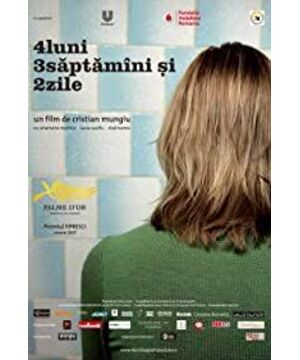The tone of the whole film is relatively dark, and a large number of colors such as blue, black, and yellow are used to cast a haze on the story, expressing a tense, anxious, and gloomy atmosphere, and also expressing the darkness of the society itself and the dim mood of the characters. The emotional tone exaggerates the atmosphere and highlights the subject - a profound criticism of the patriarchal society.
The whole film is narrated from an objective and calm perspective. As an audience, it is more like a bystander, with a fixed long shot, giving enough time to observe and understand. We can clearly see the figure of Leah, which is getting smaller and smaller. ,further and further. The deep dark night embodies the coldness and oppression of society, and the invisible atmosphere becomes tangible, thick and suffocating.
The same long shot is also used in the scene of Leah going to her boyfriend's house for dinner. For a long time, we can clearly see the impatience and unhappiness on Leah's face, the boyfriend's isolation, cowardice, and no responsibility. The people around were noisy and sarcastic. We are immersed in an atmosphere of embarrassment, tension, helplessness, and impatience. Many times women are oppressed and despised, not only from men, but even more from women who are so-called "daughter-in-law become mother-in-law". This has also happened in China. The weak oppress the weaker, sad and common social reality.
The setting is very realistic, allowing the audience to enter involuntarily and experience the sadness of that period of history more deeply. The long shot of photography is full of foreground and background, and the picture is not empty. It is in line with the relationship between the characters and the historical background. It is reasonable and reasonable. The picture is scattered and not empty.
The composition of the film is very delicate and reasonable. The triangular composition represents stability. When Uncle, Leah, and Gabita are in a triangular relationship, the atmosphere is stable. When the triangle breaks down, things take a turn. And when Leah agrees to use her body in exchange, the triangle reappears and the trio becomes stable again.
Use center composition. Express character, psychology. Leah's monologue to Gabita after finishing. The side face allows us to see the whole face of the character, and cannot understand the whole mood of the character. It expresses the complexity of Leah's heart at the moment, the forced humiliation, the resentment for Gabita's lying, the helplessness, and the mixed feelings of guilt.
The use of lighting is also amazing. When Leah and her boyfriend quarreled, her boyfriend's face was brighter in the light at the beginning, showing that Leah was at a disadvantage at the moment. The boyfriend's mother came in and turned on the light, shining on Leah's face, her boyfriend's face sank into shadows, indicating that Leah has a certain awakening and thinking at this moment. It also shows that her boyfriend is cowardly in the face of "if I am pregnant" and has no responsibility. The simple lighting expresses the character and psychology of the characters, which is amazing.
The sad and painful social system, rotten and broken Romania, focuses on a story of abortion. Small phenomena reflect the big environment, see the big from the small, and feel deeply. The women's repeated compromises, forced insults, and innocent abandonment all finally focus on the vague flesh ball in the bathroom. The extreme physical discomfort arouses deep reflection, and is displayed and criticized in the most direct and cruel way. The fallen fetus is not only an unborn life, but also a microcosm of the oppressed tens of thousands of innocent lives.
Humanity is well represented in this film. Leah's kindness, help, camaraderie for which she dedicated herself. The shamelessness and hypocrisy of the doctor's uncle. Gabita's pathetic and hateful. Leah's boyfriend is cowardly and irresponsible. The despicableness of human nature and the intertwined manifestation of light make people shudder.
Leah's boyfriend, boyfriend's father and father's friend, Uncle reflects a patriarchal society, a male group. They take no responsibility as they should, shamelessly persecute and humiliate, and criticize and criticize girls in every possible way. They intend to objectify women as a tool or object. Prohibition of abortion, forced reproduction, male inferiority and desire for control are vividly reflected.
The boyfriend's mother and female relatives represent another group, a sad woman who has been objectified and enslaved. They try to oppress the new generation in the same way they once oppressed themselves, and make them who they are. But Leah's mother turned on the lights when they were arguing, perhaps a sign of the Illuminati and the reflection of the older generation (nonsense...)
Leah, Gabita, and female students represent an emerging group. They have not been completely enslaved, but they are experiencing and feeling the most profound generation. It is not just Gabita who was abandoned and miscarried, her classmates and her compatriots, thousands of Romanian women are also facing hardships. After they experienced darkness, they doubted the world. Maybe someone will finally stand up and tear open the fig leaf and the hypocritical faces of the patriarchal society.
The director uses a few images to condense the big social background into the relationship between small characters. The story is simple and profound. With the most direct, real, sharp pictures, the most straightforward facts, and the most stimulating physiological senses, it is undisguised and candidly revealed, bringing huge visual, psychological impact, sharp irony and showing that it is based on women's pain. In the patriarchal society, tearing off the fig leaf, those rotten and stinking tumors are clearly presented, and there is no need for the director to have too much subjective perspective, tearing, presenting, and reflecting.
The film does not give a clear answer at the end. The two girls are sitting opposite each other, and the picture is equally divided to form a check and balance, and they are silent. The thinking in the hearts of the two girls may eventually turn into a fire, or they may become calm and continue to be enslaved and forced. We don't know, this is also the end of the film, which is very meaningful.
Before dawn is night, after dawn is a brighter future? Contradictions in society drive development, oppression drives power, and the transition from patriarchy to equality is the replacement and renewal of society and the inevitability of history.
The seeds have been planted, and great changes in society are imminent. The storm is coming, only stronger, braver and stronger. In order not to be hurt, fight for their rights! Get rid of the system, break free from the cage, pull away the restraining hand, grow, flourish, wipe the dirty soil with new green, and bring new vitality!
View more about 4 Months, 3 Weeks and 2 Days reviews









